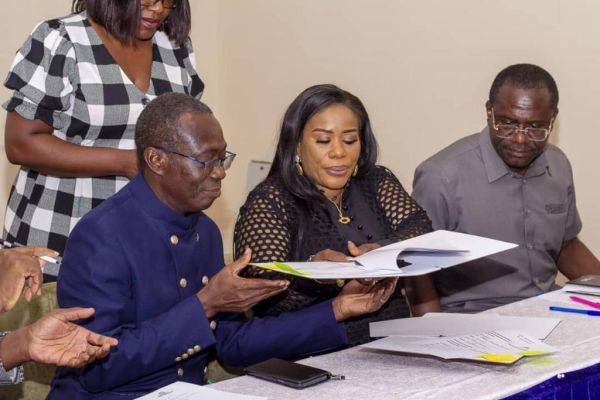A Memorandum of Understanding was signed between the Asian African Consortium (AAC), a division of the Jospong Group of Companies, and the University of Cape Coast (UCC) to conduct research to increase the production of rice, maize, and soy in the nation.
In order to achieve food efficiency in the nation, the goals of this partnership are to define shared areas of collaboration to fulfill the overall mandate of the parties, establish a strategy for collaborative operations, and specify the scope and guiding principles of engagement between the parties.
At the signing event on Thursday, April 20, 2023, in Accra, the AAC's CEO, Mrs. Adelaide Araba Siaw Agyepong, stated that the agreement will make it easier for ACC to work with the UCC research institutions around Ghana to further research and development. Deal with obstacles to economic expansion and development in order to promote social transformation.
She continued by saying that it will also make it easier to form a research and development consortium made up of experts in business, crop science, technology, agriculture engineering, and chemical engineering to serve as a permanent committee and provide guidance on the entire value chain in the production of rice, maize, soy, and other staples.
She said again that the construction of a seedling facility for the commercial production of seedlings for sale to farmers would be made easier as a result of this agreement.
She emphasized that the ACC's integrated rice project aims to make Ghana self-sufficient in rice production, which would have a big positive impact on the nation's economy.
Cooperation, according to the CEO of AAC, is essential for fostering collaboration and advancing Ghana's economy.
The agreement between the two schools particularly delighted Mrs. Siaw Ageypong, who expressed hope that this MoU will open the door to numerous other forms of cooperation between the two institutions.
Prof. Johnson Nyarko Boampong, vice chancellor of the University of Cape Coast, reaffirmed that the institution offers specialized training to help students become self-sufficient and successful businesspeople as well as job creators.
"We also put a lot of effort into giving our pupils the skills they need to succeed in life," he continued.
He bemoaned the fact that Ghana still imports food despite having access to enormous resources and fertile land at home.
It is quite regrettable that Ghanaians must import food from other nations to support themselves, whereas nations without fertile lands have developed creative methods to He lamented, "Produce food locally and even export."
He emphasized that the university is completely behind the project and that it has bought 450 acres of land for agricultural use as part of its tiny contribution to efforts to reduce imports.
Dr. Joseph Siaw Agyepong, executive chairman of the Jospong Group, stated in a few words that agriculture and research must work together to guarantee that the nation benefits fully from both.
He stated that as rice has become a staple meal in Ghana, efforts must be made to grow quality rice in the required quantities, supported by research, and this cannot be done without the involvement of academics.
He urged the university to make sure they develop seedlings that can resist the circumstances in Ghana.


